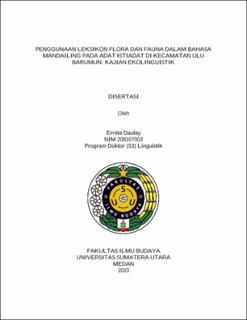Penggunaan Leksikon Flora dan Fauna dalam Bahasa Mandailing pada Adat Istiadat di Kecamatan Ulu Barumun: Kajian Ekolinguistik
The Meaning of the Philosophy of Tradition and Customs of the Mandailing Tribe in the Ulu Barumun District Throughthe Utilization of the Flora and Faunalexicon: An Ecolinguistics Study

Date
2023Author
Daulay, Ernita
Advisor(s)
Widayati, Dwi
Sinar, T Silvana
Tarigan, Bahagia
Metadata
Show full item recordAbstract
This research discusses the use of the flora and fauna lexicon in the Mandailing language in Ulu Barumun Regency, which is motivated by the people's knowledge and understanding of their customs, which reflect the philosophical meaning of their customs. This research shows the close relationship between the community and the natural surroundings, the relationship between speakers and their relationship with the natural environment, and the social environment, which produces a variety of languages. This research uses the ecolinguistic theory by Bang and Door (2000), which suggests that language is understood as a social practice or manifestation of human social activity. The problem formulation developed in this research is as follows: 1. What is the flora and fauna lexicon in the Mandailing language used in customs in Ulu Barumun Regency? 2. What are the philosophical meanings of customs in Ulu Barumun Regency in using the flora and fauna lexicon in the Mandailing language? 3. What is the community's understanding of the flora and fauna lexicon in the Mandailing language, as well as the philosophical meaning of preserving customs? This research aims to categorize the flora and fauna lexicon in Mandailing language used in customs in Ulu Barumun Regency, interpret the philosophical meaning of customs in Ulu Barumun Regency in the use of flora and fauna lexicon in Mandailing language, and relate the understanding of the people in Ulu Barumun Regency to the lexicon of flora and fauna in the Mandailing language as well as the philosophical meaning of preserving customs. The method used in this research is ethnography, which is mixed research or mixed methods. The data in this research is a lexicon of flora and fauna in the Mandailing language used in customs in Ulu Barumun Regency. This research data collection technique consists of observation techniques, interviews, and questionnaires. Observation techniques were used to learn about the implementation of customs; interview techniques were used to obtain data on the flora and fauna lexicon used and the philosophical meaning of customs in Ulu Barumun Regency, Padang Lawas in Mandailing language. At the same time, questionnaires were distributed to determine the community's understanding of the lexicon. Flora and fauna are used in the Mandailing language in its customs. The results of the analysis are presented descriptively. Through this research, the researcher concluded that there are 50 uses of the flora and fauna lexicon in the Mandailing language in the customs in Ulu Barumun Regency, which are closely related to nature which is analogous to a situation seen and obtained through the people's mindset or understanding of various events encountered in life. , and 27 customs reflect philosophical meanings that provide blessing values in life so that they are used as guidelines by the people, both individually and in social groups, that describe the relationship between humans and the Creator and human relationships with fellow living creatures found in the natural surroundings.
